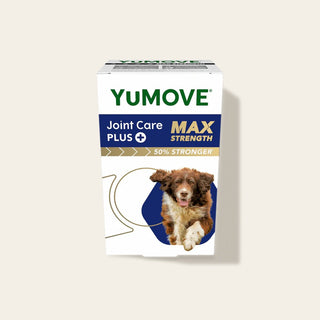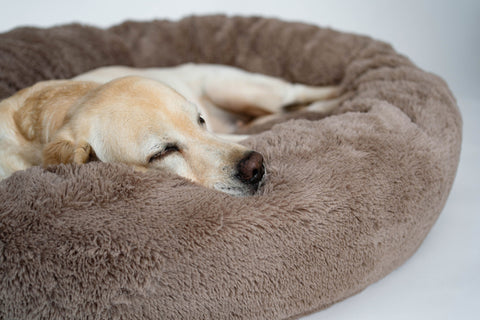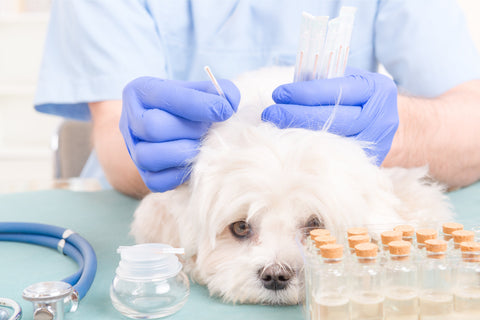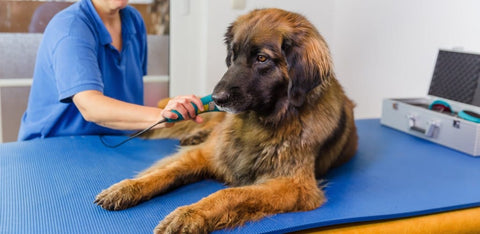
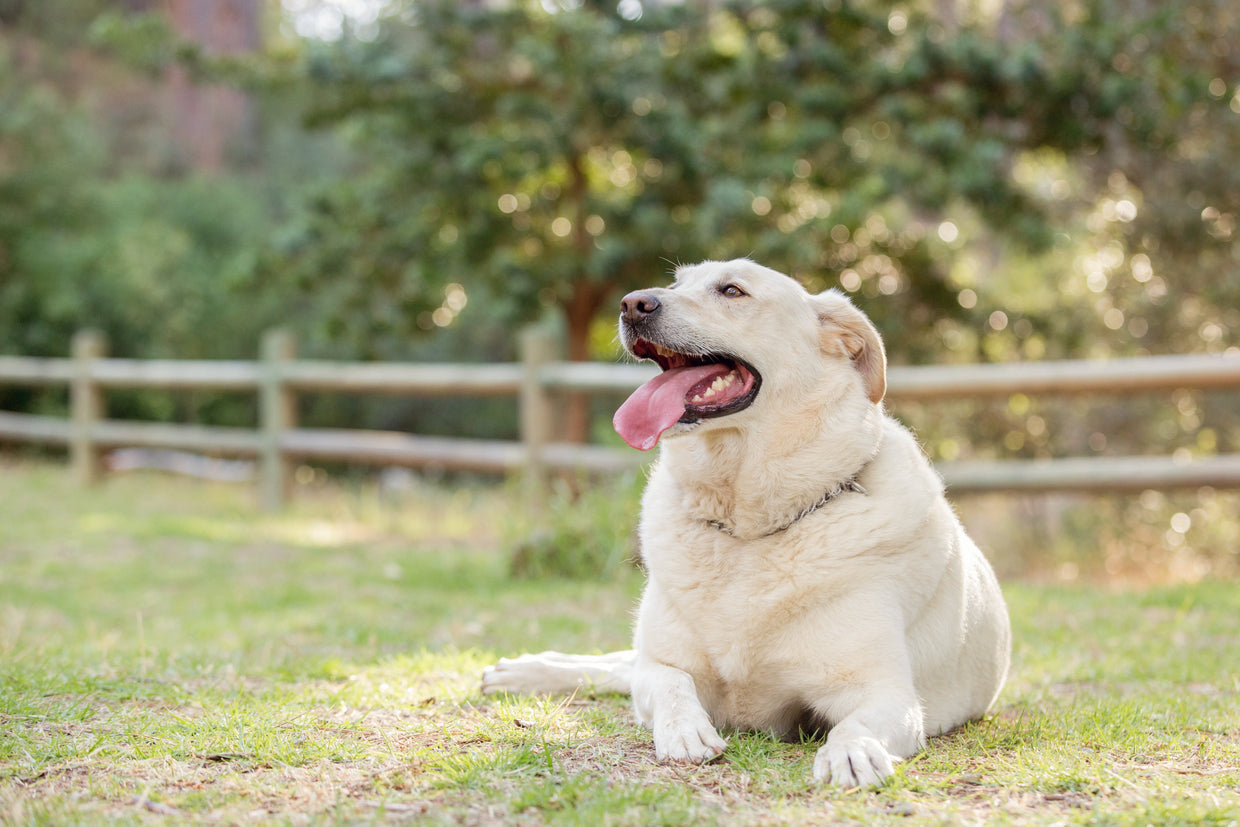
Canine obesity and joint health
Did you know that joint stiffness is one of the most common experiences that can affect your dog? And – like in people – one of the main reasons for joint stiffness in dogs is excess weight. In this helpful guide, we focus on the reasons why extra weight causes joint stiffness and what you can do to help…
Obesity in dogs: how big is the problem?
Obesity is one of the biggest health problems for dogs in the UK. And being overweight can lead to joint stiffness, heart problems and cancer. It’s said that 51% of dogs in the UK are overweight, and obesity is one of the key causes of joint stiffness in dogs.
That’s why it’s so important you help your dog stay an appropriate weight for their breed and size. Weight loss in dogs requires both tweaks in diet and exercise, as well as management of any other underlying issues.

What happens to the joints with weight gain?
With joint stiffness, your dog’s joints either become inflamed and stiff, or the bones rub together – also causing stiffness. And being overweight sets the stage for joint damage and subsequent joint stiffness. That’s because extra weight intensifies the stress that’s put on your dog’s joints.
Not only do overweight and obese dogs put more strain on their joints in every step, but the extra fat causes increased inflammation of the joints.
Is your dog overweight?
The easiest and most reliable way to understand if your dog is overweight is with your eyes and hands. Here are a few key areas of your dog you should examine:
- The ribs. In healthy dogs, you should be able to easily feel your dog’s individual ribs with your fingers.
- The abdomen. This part of your dog should look like it ‘tucks up’. Ideally, the angle from your dog’s abdomen to their pelvis should be between 30 and 35 degrees.
- Their lower back. At the bottom of the rib cage, you should be able to feel an hourglass-shaped indentation.
Take a look at our handy guide on dog weight to get more information on what to look out for. Still unsure if your dog is overweight or not? Take them to your vet for a general wellness check.
Our top tips for looking after an overweight dog
- Ask your vet for advice on diet and exercise to suit your individual dog according to their age, breed and current level of fitness.
- Go on plenty of healthy walks with your pup. You’ll both feel better for getting out in the fresh air and staying active.
- Feed your dog a healthy and nutritionally balanced diet. This should be high in protein, with small amounts of fat and minimal carbohydrates.
- Check you’re giving your dog the right portion size. It’s easy to feed your dog too much if you’re judging the amount by eye rather than using scales or a scoop.
- Don’t give your dog food that’s meant for humans. Food that’s meant for us is often too high in fat, sugar and salt for dogs.
- Add a dog joint supplement to their diet. If your dog experiences joint stiffness, then a supplement can help soothe their stiffness, which in turn helps with weight loss.
How YuMOVE Joint Care PLUS helps your overweight dog’s joints
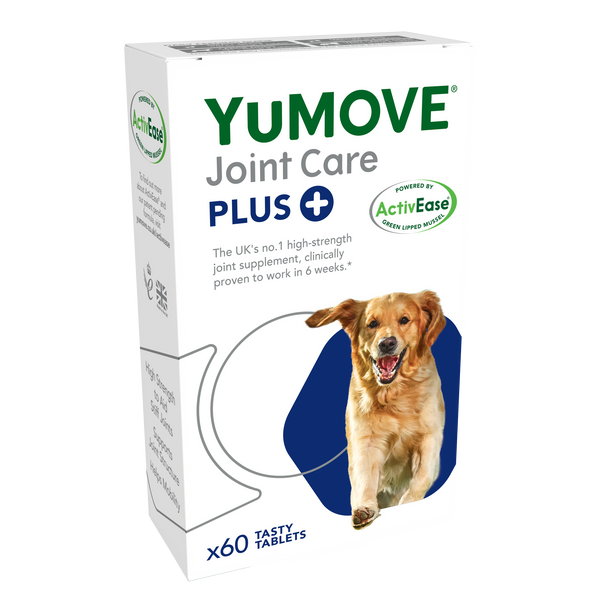
Dogs with joint stiffness tend to slow down and are less interested in exercise – including walkies! As a result, this can lead to weight gain. And as mentioned above, extra weight puts pressure on your dog’s joints.
That’s why it’s a good idea to start on joint supplements as early as possible. And ones with joint-soothing ingredients – such as Glucosamine, Chondroitin, and Green Lipped Mussel – can be the most effective in slowing down the effects of stiffness. That’s where YuMOVE comes in.
YuMOVE Joint Care PLUS for Dogs is our extra-high-strength canine joint supplement, specifically formulated for older dogs or dogs who may need additional joint support. Each tablet works to soothe joint stiffness, support joint structure and help support mobility.
What’s more, it delivers visible results in just 6 weeks.* In fact, we’re so confident in our products that we offer a guarantee – see the difference in just 6 weeks, or your money back.**
The other end of the scale: underweight dogs
Most people assume that it’s healthier for a dog to be underweight than overweight. But being too lean comes with its own concern. Being underweight can make your dog more likely to pick up bugs, reduce their muscle mass and – in the worst cases – can result in reduced bone density.
The signs your dog is underweight:
- Clearly visible ribs and spine
- The bones at the base of their tail stick out
- A steep rise from their abdomen to their hips
How to help an underweight dog
- Speak to your vet, who can rule out any underlying medical problems
- Provide enough food in line with their age, breed, size and activity level
- Don’t give your dog treats and snacks – they need balanced, nutritious food
- Carefully and slowly increase the amount of food you give to your dog
Do you have some of your own tips for keeping your dog a healthy weight? Share your ideas with us and other dog lovers on our Facebook and Instagram pages.
*Canine study conducted by the Royal Veterinary College. Excluding YuMOVE Joint Care for Young Dogs.
**For full terms and conditions see YuMOVE.co.uk/YuMOVE-guarantee.
